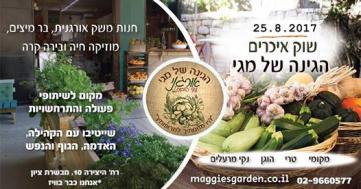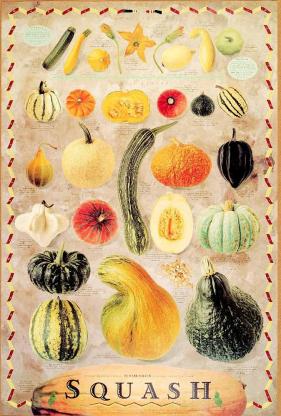The Yore, the first rain – totally danced on my roof! It was a real Jerusalemite rain, a good long one (because it could certainly have come in the form of a few symbolic drops…
After all, this is notEurope here, and rain for longer than half an hour does count! Absolutely!).
It was a proper rain too, it formed puddles with bubbles and everything, even producing the proper scent… of course the smell of the rosemary bushes growing near me and of all the dust that washed away leaving the air shiny clean and fresh.
I expected rain during Sukkot, and then assumed it would arrive right after the holiday, and then I had to muster all my agricultural patience –and eventually it arrived.
Whenever the first rain comes I think of the ancient farmers from long long ago (as well as a small portion of the farmers today) for whom the rain is their only source of irrigation – the so-called dryland farming.
This dryland farming is called in Hebrew Ba’al Farming. Ba’al means owner, or lord, or husband and indeed dryland farming requires careful husbandry of the moisture available for the crop.
The name Ba’al is probably derived from the name of the ancient god, to whom they had to behave nicely in order to receive the blessing of rains in due time.
The Ba’al was the Canaanite fertility and storm god (a fascinating combination of two responsibilities, which could be possible only among an agricultural community that is constantly concerned about rain – the storm and fertility come together, with the rain clouds).
Husbandry farming was more common is very mountainous areas, where planning the irrigation was extremely complicated (in the days when there were no irrigation tubing and drippers were not available).
If there was no available water reservoir nearby, that can be used to irrigate manually, they would rely only on what was poured from the sky: if there was no natural rainfall – there is no crop; if there was too much rain – the crop was also damaged. If there were any farmers who constantly looking up to the sky with worried eyes – they were the dryland farmers.
Surprisingly even today there is dryland farming, also in the country. Wheat crops rely for the most part on dryland farming, and some farmers in the north of the country who rely on traditional cultivation methods also manage to get along with dryland farming and produce wonderfulproduce.
What is even more surprising is that dryland farmingalso exists in the south, in the Negev region which is considered quite arid and desolate. The Negev allows wheat and barley crops to grow solely on natural rainfall method – and experiments done in the area show that even fruit trees (such as figs, pomegranates and even peach trees) can thrive by using the runoff water. The runoffis the rainwater that flows down the slopes to the bottom of the wadi.
The most famous area (and with the most beautiful landscape and is definitely worth a visit – especially during this season, and especially now after the closure) is the Ba’al trail in the Sataf area.
The entire project recreates the way farmers survived in ancient times, and the methods they used in order to cultivate and increase the crops (it is fascinating to walk around the area and try to imagine the landscape centuries ago, without all these visible antennas all around).
The expectation of rain, for us and probably also for the ancient farmers was mixed with patience and the understanding that it will be a gradual process – although we are already thirsty for winter, it is for the better for the rain to come gradually.
Gradually, coming out of this lock down, the fields will convert and winter produce will replace the summer and fall crops. The oranges will become more orange, the leafy greens will grow bigger and fresher (have you noticed how the baby mix has become more crunchy and juicy?).
I will soon present to you all of these greens, telling you how much you should have it in your kitchen, where it came from and what other varieties of it are around the world. But in the meantime, I want us to notice this special time, this “in between” time, it is not quite winter yet.
It is like a weather swing, which also symbolizes the man-made swing that is taking place right now, with all the uncertainties and anxiety and mood swings of this period (of the closure –as well as the exit from it. We should take the time to adapt to these changes as well).
I want to kindly remind you – our packing and delivery department is working in full speed.
If you would rather not come to the store, or would like to make someone happy by delivering a box full of fresh organic delicious goodies, feel free to contact us by phone, WhatsApp, email or by placing an order directly through the online system and we will be happy to help.
Yours.
The Garden’s team
Forecast:
In the ORGANIC vegetable baskets we expect (draft only):
Cucumber
Tomato
Lettuce
Potato
Eggplant
Swiss Chard
Sweet potatoe
Parsley
The Large organic vegetable baskets also include:
Zucchini
Spinach
Coriander
In the ORGANIC fruit baskets (NEW – Increased variety, price – 70 Shekels)
Oranges
Red grapefruit
Banana
Sweetie
The large ORGANIC fruit baskets also include: ( NEW – Increased variety, price -100 Shekels)
Leomon
Papaya
Pomegranate
The ORGANIC Green Basket:
Swiis Chard
A kind of lettuce
Kale
Dill
Green onion
Sprouts
Spinach
NEW – The ORGANIC Basket for couples (price – 150 shekels):
Cucumber
Tomato
Lettuce
Potato
Eggplant
Carrot
Pumpkin
Parsley
Swiss Chard
Cabbage
Sweet potatoe
Coriander
Pepper
Oranges
Red grapefruit
Sweetie










